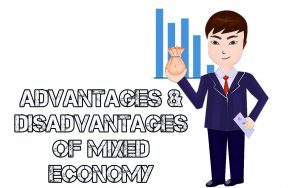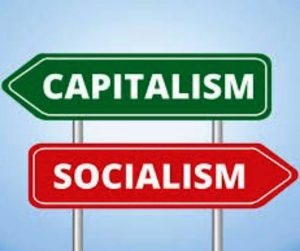Advantages And Disadvantages Of a Mixed Economy: Mixed economy is an economic system where both the private sector and the government (public sector) are involved in the means of production in the state. In such a market economy, the government is concerned with the provision of public goods, often with strong regulatory oversight over the private sector.
Simply put; a mixed economic system is an economic system that combines both features of capitalism and that of socialism. Ideally speaking, in a mixed economy, there is reduced government regulation, private industries are rendered efficient, there is better stabilization in the free-market, greater equality which reduces the rate of poverty, and government policies which promotes stabilization.

A mixed economy is neither wholly socialist nor wholly capitalist; it could be regarded as a hybrid setting. The involvement of public sector helps to stabilize and regularize the loopholes in the economy and aims at providing services which if left singly for the private sector would be produced at a cost unfavourable to the society, such as the public utility. In a mixed economy, it is the government that provides the national infrastructure for the smooth operation of the private sector.
Therefore, the government in this system plays important roles categorized as allocation, distribution and stabilization function. Mixed economy runs a free market economy which is similar to capitalism, but the government is fully concerned and involved in the market system for the purpose of protecting the interest of the public.
Recommended: Major Tools for economic analysis
Advantages (Benefits) of a Mixed Economy
1. Private sector participation: Mixed economy encourages the involvement of the private sector in production. They also enjoy the autonomy of running their businesses in their own way, as long as it is in compliance with the regulations of the state.

Because private sectors are involved in the field of production, certain decisions concerning the economy cannot be made in their absence. Therefore, they are also involved in the decision making as it concerns the economy.
2. Improvement of Social Welfare: While the government makes rules and regulations, regulating the matters relating to production in the state, the welfare of the citizens is put into consideration. Mixed economy also gives the government the ground to provide goods and services that are of social benefit to the citizens. The private sector relieves the government of the sole duty to plan and manage the economy.

The government then channels their strength towards playing supervisory role where necessary, and then towards the interest of social benefits to the citizens. The private sector is also not precluded from providing social benefits. Sometimes they are conditioned by agreement to provide social benefits in exchange of tax reduction or waiver.
Also see: Advantages And Disadvantages Of Capitalist system
3. Reduction in Market Failure: Because the public and the private sector are involved in the economic system of the state, the chances of market failure are limited. Both sectors serve as aid towards the other.

The government in this setting can make up for the imperfections of the private sector by filling up their loopholes, while the private sector on their own side plays similar complementary role.
4. Efficiency in Production: There is efficiency in production in the sense that goods are continuously available, and the resources are effectively channeled towards satisfying the people’s need.
Because every sector is allowed to get involved in the means of production, multiple production industries are established. When products are not available for the flow of market, it brings about increase in price, and this is essentially what the practice of mixed economy system helps to circumvent.
Recommended: Countries with the highest currency in the world
5. Economy development: Mixed economy practice helps boost the economy of the state. Because there are readily available industries owned by various sectors, employment opportunities are created which rapidly increases the production capacity of the state.
6. Mixed economic system encourages Competition and limits Monopoly: The setting of a mixed economic system provides a ground for competition in the field of production. This is because the system allows for the participation of the private individuals in the means of production and they are free to run their businesses in their own way.
Monopoly is the accumulation of the means of production by few individuals. The occurrence of such in a mixed economy is limited because every person is free to participate.
Recommended: Advantages and Disadvantages of being a teacher
7. Government Intervention, Interference and Regulation: In a mixed economy, the government can intervene to regulate the price system. The government can subsidize the cost of production for the private sector in order for the products to have affordable market price. Also, because the state is concerned with the economy, it has the power to influence production and consumption. This it can achieve either directly or indirectly.
For instance, the government can reduce the level of alcohol consumption in the state by levying high taxes on the companies producing alcohol. This will simply increase the price of alcohol and thereby deter people from its frequent consumption. Because the government makes regulations that can affect the private sector, the autonomous influence of the capitalists becomes subjected to regulations.
Not just this, by government interference, the public sector can then produce goods which cannot be produced or be efficiently produced by the private sector. Individuals are by this protected from the abuses of private monopolists. When the government is involved, there would be employment opportunities; there would be balanced regional development. The interference of government in the means of production will help regulate the imperfections of the private sector.
Recommended: Which Economy System is the best and why? Answered
Disadvantages (Weaknesses) of a Mixed Economy
1. Profit Inclined: Since the mixed economic system involves the private sector, profit-making becomes the primary objective whereas the citizens’ welfare comes after. This would be worse where the involvement of the private sector outweighs the dominance of the government in the field of production.

2. Government Interference: Government interference may bring about bad policies and regulations affecting the private industries. The power of the government to make regulations that can affect the private sector actually gives them certain unwarranted degree o control and management over them. By so doing, the autonomy of the private sectors are tampered with.

Government interference can as well bring about corruption and mismanagement in all sectors. Individual companies may engage in lobbying to get polices favourable to them at the expense of the citizens’ welfare. And where the individuals in government power are the industrialists, it creates a wide setting for corruption and mismanagement to ensue.
Recommended: Difference Between Data Science and Data Analytics
3. Tax: Private owners may be imposed exorbitant tax rates which can affect the price of goods generally. When the tax rate is high, the price of the goods would be higher too. In a corporation for instance, tax is levied both at the company and at the individual level. This is clearly double taxation and it counts to the production cost assessment which in turn influences the price of products. On the other hand, tax payment may become compromised by personal relationships and interests.

4. Decision Making: The decision making process in a mixed economy is usually rigorous, since it involves both public and private sectors.
Also see: Most profitable agricultural businesses to start
Conclusion
There is no country that practice absolute socialism or capitalism. Thus, every country has some elements of socialism and capitalism. It is the degree at which private and public ownership of the means of production operate that defines the economic system practiced.
In a mixed economy, both state and private enterprise constitute and drive the market. Both sectors have control of owning, making, selling and exchanging goods in the country. Mixed economy is regarded as the best practice because it encourages competition between socialism and capitalism.

Edeh Samuel Chukwuemeka, ACMC, is a lawyer and a certified mediator/conciliator in Nigeria. He is also a developer with knowledge in various programming languages. Samuel is determined to leverage his skills in technology, SEO, and legal practice to revolutionize the legal profession worldwide by creating web and mobile applications that simplify legal research. Sam is also passionate about educating and providing valuable information to people.

Great job???